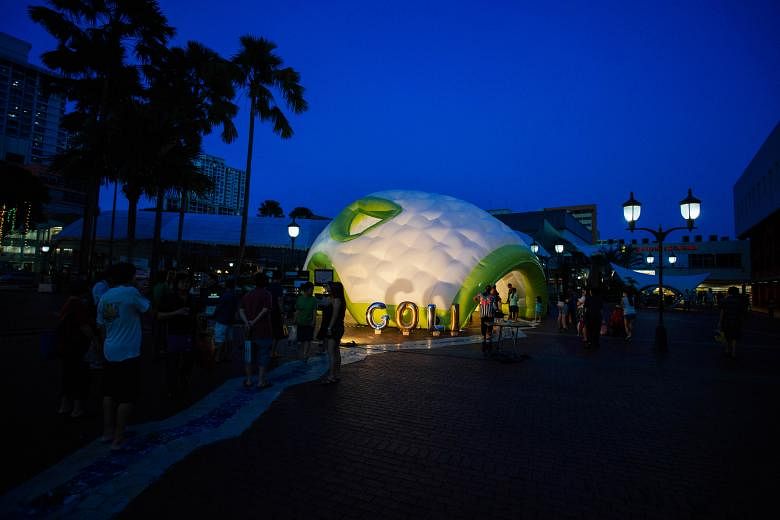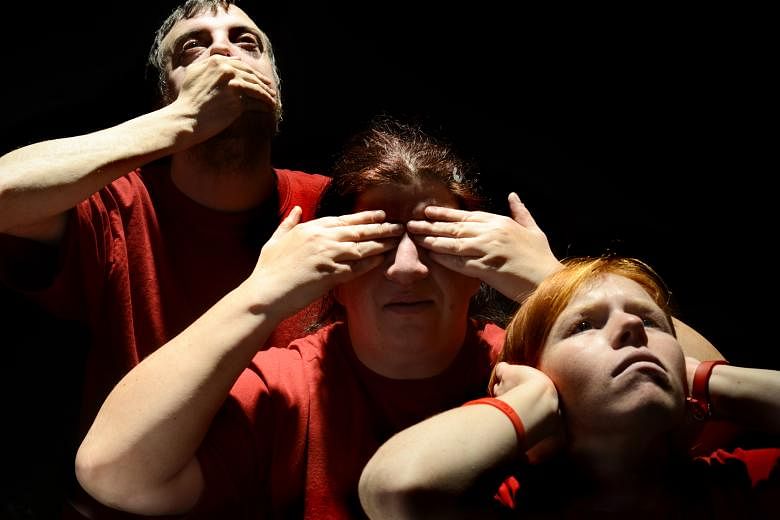More than 20 years ago, a seeming death knell sounded for forum theatre.
The interactive art form was savaged in the media, it would receive no funding for a decade and it came under fire as a "scriptless" genre that could be "exploited" and used as a form of political agitation, as put by former Minister for Information and the Arts George Yeo.
Fast forward to today. Next Friday, local theatre company Drama Box will launch an entire festival dedicated to forum theatre - an outdoor festival right on the doorstep of one of Singapore's busiest heartland malls, Nex in Serangoon.
At the Scenes: Forum Theatre festival, members of the public will get the chance to see free forum theatre performances on a variety of issues, from disability harassment to forced marriages, by theatre groups from Taiwan, India, Britain and Singapore, as well as take part in sharing sessions and workshops.
All of these will take place in large, green- and-white inflatable theatres constructed specially for community tours of plays. Sponsors and supporters of the festival include the Arts Fund, the Singapore Tourism Board and the Community Foundation of Singapore.
Alvin Tan, 52, founder of The Necessary Stage, which pioneered forum theatre in Singapore, is cautiously optimistic.
He tells Life!: "Drama Box's success in executing forum theatre in the outdoors is a celebration of sorts. It is indeed the way to go in trusting artists working in and with the community."
Turbulent history
For Drama Box's artistic director Kok Heng Leun, 49, who worked together with Tan at The Necessary Stage in the early years of forum theatre, this festival is not unprecedented, but a logical culmination and celebration of what Drama Box has been quietly, consistently working on for many years.
Since it was founded in 1990, the bilingual theatre company has produced at least a dozen productions incorporating interactive and forum theatre elements such as Have You Eaten? (2001), Dua Dai Ji (2005, 2007 and 2009) and Soil (2006), which were well received by audiences.
A form of social theatre devised by Brazilian Augusto Boal, forum theatre allows audiences to step into the actors' shoes to change a play's outcome.
Kok recalls how back in July 1993, several hundred people packed the tiny Substation Theatre over a week for Singapore's first foray into forum theatre. Two plays by The Necessary Stage were on show: MCP, about a woman with a chauvinistic husband; and Mixed Blessings, about interracial relationships.
After the short plays were performed the first time with tragic endings, the usually reticent Singapore audiences got to their feet to come up with new solutions and different, happier conclusions to these fraught family relationships.
As with the format of forum theatre, audience members could replace characters in the show and act out different plot lines, moving from the passive position of spectator to what is termed the "spect- actor" in forum theatre lexicon. There is also always an experienced facilitator, known as a joker, on hand to manage the audience and the play.
Tan says, tongue firmly in cheek: "To entice the first few participants is like constipation. Then later, it becomes like diarrhoea, difficult to stop people from participating."
Early newspaper reports were very positive. On Mixed Blessings, this newspaper said: "One woman went on her knees to soothe the heroine's angry parents when they found out she was dating a man from another ethnic group. Another went onstage to demand the actor's parents choose between the hero leaving the family and accepting the girl he loves."
But just half a year later, forum theatre was under threat, lumped together with another "scriptless" genre, performance art, after a controversial performance art show by the arts collective 5th Passage in late 1993.
The media alleged that The Necessary Stage had Marxist connections; Boal was an avowed Marxist and, at the time, this was a dirty word here, with 16 people having been detained in 1987 under the Internal Security Act for allegedly being part of a Marxist conspiracy to overthrow the Government.
This led to a drought in official funding for forum theatre until the Censorship Review Committee proposed otherwise in 2003, lifting this funding ban.
Forum theatre has since been applied to many different contexts - to train grassroots and community leaders as in Drama Box's Trick Or Threat (2007), about a possible MRT bombing and the strain it exerts on race relations; and also in the Institute of Policy Studies' Prism project with the show, Wouldn't It Be Nice? (2012), which imagines what might happen if disaster struck Singapore in 2022 and encouraged audience members to come up with concrete solutions to difficult situations.
Rehearsal for real life
All the same, there are lingering suspicions of the art form as a possible tinder box for potentially reactionary audience members.
Kok and the Drama Box team, however, are certain that this is not the case.
Festival director Koh Hui Ling, 36, witnessed a positive instance where audience members actually put a rambling, ranting "spect-actor" in his place during a workshop at the 2011 Singapore Theatre Festival organised by Wild Rice.
The short play dealt with the meaning and necessity of the Singapore pledge, but a participant had abruptly gone on a rant about housing regulations in Singapore, an unrelated tangent.
She says: "Before we went up to stop him, the audiences were already murmuring. When I went up to pause it, all I had to do was to ask the audiences what they were thinking. They said, it's not about you and your story, but the issue we're talking about. I didn't have to do much - the audiences were having a constructive dialogue and they went back to the topic. It gave me a lot of faith in audiences. People know when to say yes and no."
Kok says: "The question is, can the authorities trust that art is a ground whereby people can be both responsible as well as very imaginative?"
They feel that forum theatre can be a safe space to deal with issues where an audience is polarised. Audience members can see things from different points of view and agree to disagree. A mature society, Kok feels, is one that can take dissension without having its social fabric ripped apart.
The current festival will not just feature Singaporean performances dealing with day-to-day issues, but also work by international counterparts dealing with a host of topics.
Lisa Mallaghan, 37, senior producer at theatre company Mind The Gap of the United Kingdom, believes that it can take small steps to help change lives for the better. The company works with professional learning- disabled actors to create impactful theatre productions and will be presenting one here.
She recalls how an audience member in Britain, a woman from the city council, later boarded a bus and saw a disabled passenger being treated unfairly by the bus driver, then promptly "stood up and said, this is not acceptable".
That, for Mallaghan, was a small but significant success. "I'm not saying for a second that we're going around changing the world. But if we can get a few more stories like that, people actually changing the way they behave - it's not about the bad guys. It's about all of us, the bystanders and everybody else who can change the way we act on a day-to-day basis to prevent inequality and hate crimes from happening."
Mind The Gap's resident director, Hong Kong- born Joyce Lee, 31, will be coming to Singapore for the festival with three learning-disabled actors to perform Real Voices Real Lives, a participatory work that draws directly from hate crimes or violence that disabled people have experienced in real life.
Lee says: "People might say, social workers need to do more, the police need to do more - not me. But in forum theatre, everybody is implicated in this situation. How would you change yourself on a day-to-day basis?
"When they see a situation that can be quite intimidating in real life, they think, what should I do? How would I challenge the situation? What kind of difficulty will I face when I stand up for that person being victimised?
"Forum theatre is like a rehearsal for real life for the audiences. They've tried it out, they've prepared; the antagonist might challenge me in that way but I've tried it before."
Dr Sanjoy Ganguly, 55, founder of India's leading forum theatre company Jana Sanskriti, points to a comparative study on its company and forum theatre that is being carried out under the Centre for Studies in Social Sciences, Calcutta.
While the results have not yet been published, what has been discovered so far has been very encouraging. This study of 100 villages noted that where Jana Sanskriti's teams had been presenting and performing forum theatre for more than five years, "families are much more democratised, domestic violence has drastically gone down, the women are participating in broader activism".
On the whole, these women were much more empowered than in the villages where Jana Sanskriti had not yet done work. In this vein, the work that Jana Sanskriti will be presenting at the upcoming festival will dissect the marginalisation of women in a patriarchal society.
Many of the men who have watched this play have been able to critically reflect on their own actions, Dr Ganguly says, and understand that while they may be oppressed by their employers at work, at home, they can become the oppressors in the way they treat their families. He adds: "Theatre can really humanise the human being."
Moving outdoors
Drama Box has almost always received the go-ahead to do forum theatre indoors, but performing in public spaces is still something fraught with problems.
In 2000, Kok tested the waters by bringing forum theatre on air with the help of DJ Danny Yeo. For a year, listeners could call in and "participate" in these audio plays on UFM 100.3, in the morning and later the evening primetime slots. These short plays would be based on the current affairs of the day, from the 9/11 terrorist attacks to the war in Iraq.
Later that year, after attending a forum theatre workshop in Canada with practitioner David Diamond, Kok got the confidence to stage forum theatre in public.
Drama Box did not want to reach out to the same groups of people who visited community centres or bought tickets to indoor shows. It knew that in order to truly engage with the public and understand the sentiment on the ground, it had to do it outdoors.
So it ventured out with a production about retrenchment, Have You Eaten? (2001), which to its surprise, received the green light from the police's Public Entertainment Licensing Unit. It was Singapore's first outdoor forum theatre piece, performed at the amphitheatre in front of the Toa Payoh Community Library.
In general, Koh cautions that forum theatre must be executed responsibly to engage the public well. Its philosophy is not to be top-down or didactic, nor to take the form too lightly, but to create an environment of meaningful discourse and a voice for the marginalised.
Barbara Santos, 52, a theatre practitioner from Brazil who will be giving a workshop on how to develop forum theatre at the upcoming festival, is hopeful. The Berlin-based artist, who worked closely with Boal, says: "I hope people will be open and view the challenges as possibilities.
"The last time I came to Singapore, I heard a lot of 'ah, this is not possible', 'that is not possible'. People are convinced that reality is difficult to change. What I hope that my work can influence is that reality is difficult to change, but it is not impossible... Just to include that 'if' in our perspective, we can have new possibilities emerge."
This festival has been five years in the making, including the creation of the inflatable theatres, affectionately known as "GoLi" after the popular game of marbles. The theatres take about an hour each to set up and can hold about 100 to 200 people, depending on the configuration. They will be set up in the open space next to Nex mall in Serangoon.
Over the next five years, Drama Box - which turns 25 this year - hopes to continue investigating how it might work in this new outdoors format and develop relationships with new audiences and public spaces. It may not necessarily always use forum theatre as a way of connecting with the public.
Kok says: "The more audiences you want to engage, the more you realise that one form may not speak to all... As an art-maker, you have to learn different things and work with different people to bring out that experience in a more holistic way."
He says that at the end of the day, their mission is not just about creating an active citizenry, but also to create artistic experiences that move and inspire.
He adds: "At this festival, we want to take this opportunity to look at the art itself, how it's being created and what are its limitations? We should not live with that kind of romantic vision that art can solve all problems and change society. I think it starts with how it changes an individual."
Follow Corrie Tan on Twitter @CorrieTan



